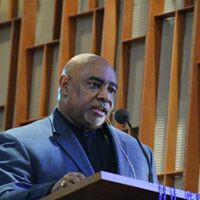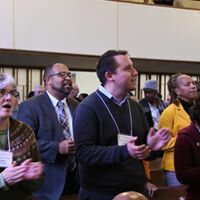Clergy have 'soul talk' at Day Apart
If clergy are addicted to hurry and overdosing on over-commitment, then this year’s Clergy Pre-Advent Day Apart was an intervention. As in other 12-step programs, the first step was admitting you have a problem and that your life had become unmanageable.
A powerful way to untangle that mess is through having “soul talks,” according to the speaker at the Nov. 13 Clergy Pre-Advent Day Apart. More than 230 pastors from throughout the Baltimore-Washington Conference gathered at Epworth UMC in Gaithersburg to learn more about this spiritual practice.
The Pre-Advent Day Apart is an annual event, held just for clergy of the BWC, going back several years. The day offers pastors the chance to recharge, reconnect and refresh.
“We are here today to rest in the Lord and restore our soul,” said Bishop LaTrelle Easterling at the start of the day-long retreat while introducing the speaker. “We are interrupting our lives with hope today.”

The Rev. Kirk Byron Jones, Senior Pastor of Zion Baptist Church in Lynn, Mass., and adjunct professor of social ethics, preaching, and pastoral ministry at Andover Newton Theological School, brought the “soul talk” message as a way of re-centering clergy’s spiritual lives as they enter the hectic season of Advent and Christmas.
And though historically, Methodists ask each other, “How is it with your soul,” Jones said that many people often don’t know what a soul is, what it does, or how it works.
“Your soul is your hidden reservoir of limitless wisdom, peace, and joy,” Jones said. “It is the part of you that God held last, just before releasing your free flight into the world.”
Jones, whose most recent book is “Soul Talk: How to Have the Most Important Conversation of All,” weaved personal experiences and a sense of humor in describing how he fell into the busy-ness trap, and how taking time for “soul talks” brought him back from the edge of burnout.
“Your soul is God’s spirit in your spirit,” Jones said, further defining the word, “filled to overflowing with lavish love, grace, and outrageous joy. More than anything else your soul wants you to know how much you are madly adored by God.”
Jones said that he grew up thinking he could only lose his soul after he died. Later, however, he learned that you could lose your soul in any number of ways. One of those ways was by being addicted to hurry.
“I could lose my soul by doing work that I absolutely love,” he said. “How precious is your soul?
The Nazarene said, in the form of a question: ‘What shall it profit a person to gain it all and lose the soul?’ Then Jesus winked and turned around. The question matters.”
Quoting from author and theologian Howard Thurman, Jones said, “There is something that waits and listens for the sound of the genuine in yourself. It is the only true guide you will ever have. And if you cannot hear it, you will, all your life, spend your days on the ends of strings that somebody else pulls.”
Such a reality, “a soul reality,” Jones said, “is too vital to ignore at all and especially to ignore in stormy times.”

Jones outlined seven steps for having a soul talk: be still; lay burdens down; listen deeply; don’t run away; be honest; be gentle; and welcome new truth. Having these talks with your own soul, Jones said, is critical because another way to lose your soul is to ignore it.
“A soul talk is engaging the soul intentionally, in deliberate, sustained dialogue,” he said.
Speaking about being honest with your soul, Jones said that your soul will never judge you and will “never tell another soul” what you said.
“Some stuff we carry is clogging up our service to others, our preaching, our teaching,” Jones said. “Bitterness can beat you down. Ministry can become drudgery if that stuff is allowed to fester. What’s inside you, you’ve been pushing aside, and not naming it… can make us sick.”
If clergy don’t pay attention to or ignore their soul, it may be because they don’t know what it sounds like. Jones said that there are seven aspects to one’s “soul sound:”
- Non-anxious – a soul never says anything to you that you aren’t able to hear;
- Clear – there is a peaceful confidence that comes with being clear; it’s humble, not arrogant; it’s being able to stand in your own truth;
- Distinct – just like the voice of your parents;
- Light-hearted – Frederick Buechner once said, “The true sign of a saint is joy.” Don’t be surprised when there’s a lightheartedness with the communication of your soul;
- Challenging – God’s voice within urging you on;
- Patient – doesn’t mind repeating itself or using other realities to make the same point;
- Divine – the soul will never say anything to us that hasn’t been pre-authorized by God.
All this soul talk, Jones said in the afternoon session, leads to four “magnificent blessings.” One of those blessings is restoration, he said.
“We can become so scattered that we don’t know where to go,” he said. “God doesn’t need your exhaustion; that’s not how to do life or ministry. (Soul talk) can pull it all together.”
Being constantly tired leads to being disconnected, Jones said, from yourself, your soul, and from others. It’s often apparent by not being “fully present” in situations as mundane as watching TV to as important as praying at the bedside of a parishioner.
“We need a lifestyle with more margin in it,” Jones said. “The world gets to see you at your freshest, your fullest and your finest. It’s selfish to withhold that from the world.”
In wrapping up his talk, Jones hit on the central tenant of God’s grace, one that is especially relevant to United Methodists. By connecting with your soul, he said, you receive the blessing of an abiding sense of God’s grace.
“Look at Matthew 28:16 through 20,” he said. “There were shouters and doubters. Jesus did not separate the crowd before Jesus made the promise; the shouters and doubts get the same promise of God’s grace.
“God’s grace holds us,” he said. “It’s almost too much for words.”
